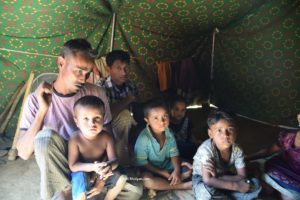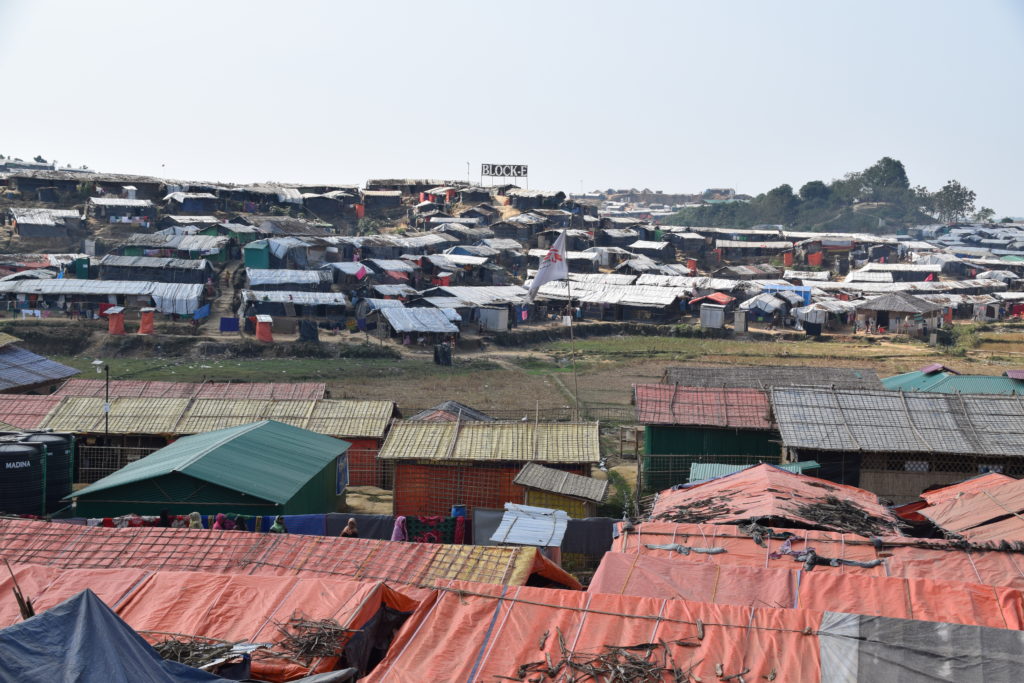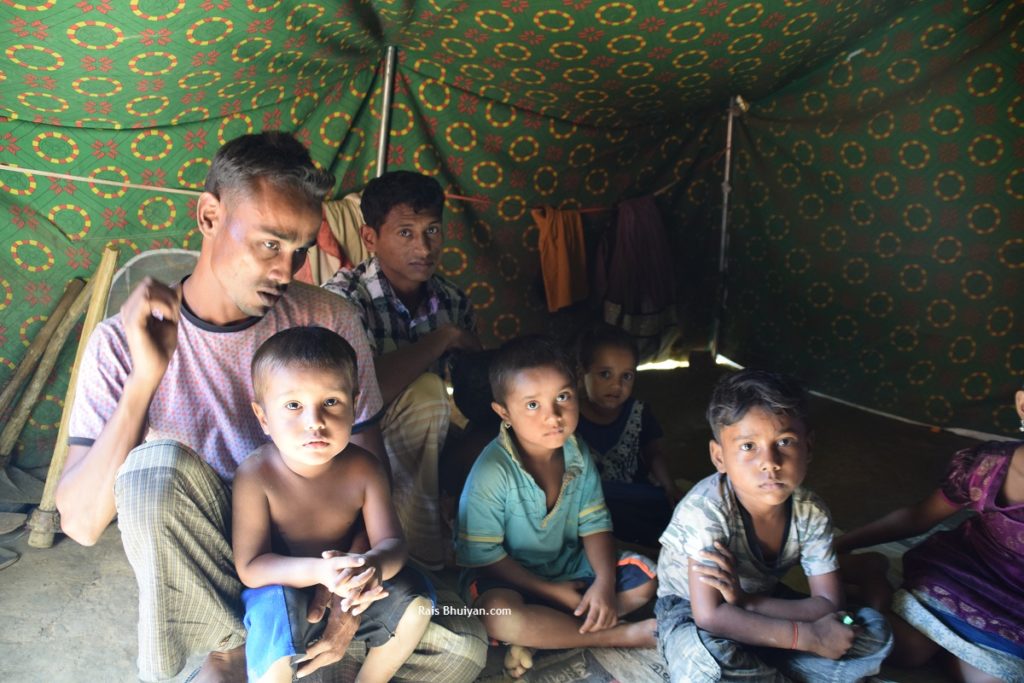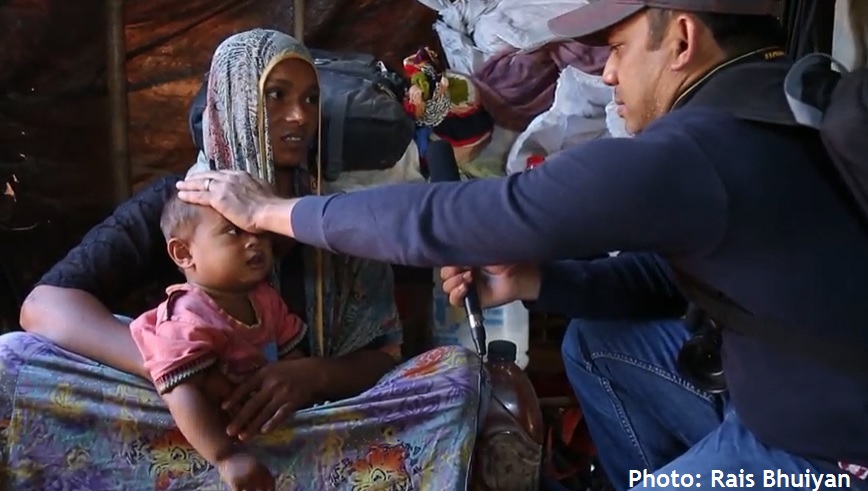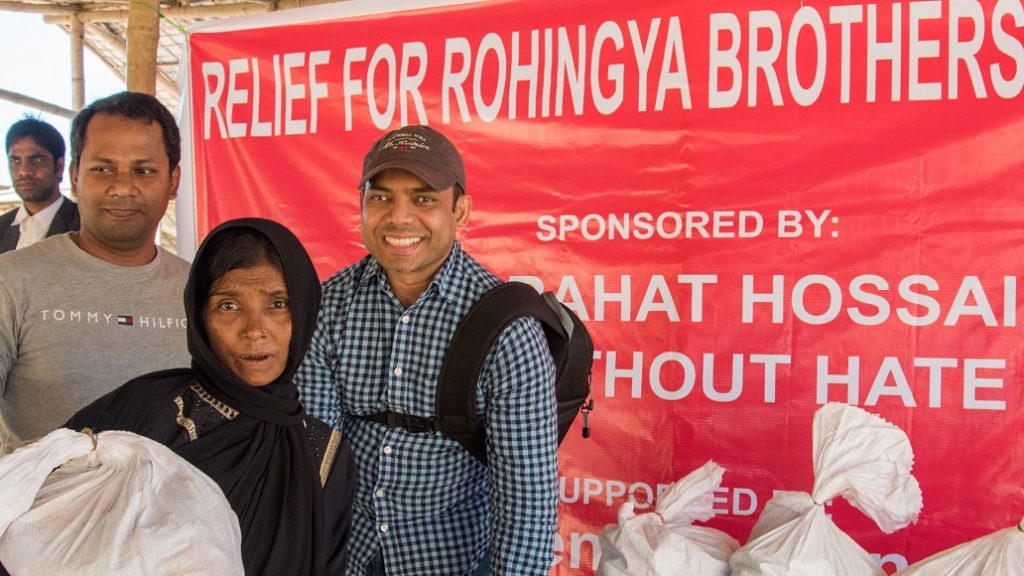A 9/11 hate crime survivor meets Rohingya refugees.
In December, I visited the largest and densest refugee camp in the world. In Cox’s Bazar, hundreds of thousands of oppressed Rohingya men, women, and children, the “lucky” ones who narrowly escaped Myanmar with their lives, are now suffering in this camp.
Visiting this camp was a life altering experience. Thousands of sickly, terrified, traumatized, and destitute Rohingya people populate an absurdly small area in southeast Bangladesh. I bore witness to their plight.
As a relief worker, I sat down with refugee families in their tiny, tarp shacks and listened to their heart-breaking and courageous stories. I saw thousands of children under the age of 10, many playing in dirt with makeshift toys made of trash. No food. No medicine. No home. No school. No future. The mercy of others is their only chance at survival.
The unlucky ones
Imagine if they were your own children or loved ones. How would you feel? These children have done nothing to deserve this life. The reason for their fate is the accident of their birth: They happened to be born into a Rohingya family in Myanmar.
They survived genocide, only to walk hundreds of miles, day and night, through hills, paddy fields, and streams, the threat of violence looming with each fragile step toward another uncertain day of existence.
Mohammed Sahel is just six and his sister, Asma bibi, only five. They, along with three other younger children, sat to play with me on the dirt floor of their family’s small tent.
How could these innocent, young children, along with many thousands like them, walk day and night, hundreds of miles on their tiny feet, falling asleep anywhere on their painstaking journey whenever their little bodies couldn’t walk another step?
But, this pain was far better than the alternative — being burned alive, beaten or shot in the head by one of the most ruthless militaries in the world, led by some of the world’s most morally corrupt civil and military leaders.
Here I am, visiting with refugee toddlers who have witnessed their loved ones being brutally murdered, their homes and land decimated, and in many cases, family members fighting to survive after severe wounds and infections from being tortured and beaten
I asked them what they ate in the camp and they told me a meagre portion of rice and lentils, and if lucky, maybe they’d get a bit of curry with green beans and tomatoes.
As I continued to walk through the camp, I saw thousands more children, many naked and severely malnourished.
These children, many only two or three years old, went through the same kinds of trauma that Sahel and Asma bibi did. No playdates or soccer practices or birthday parties for these youngsters, just the punishingly brutal reality of being a poor refugee.
A few years ago, I was invited to speak to an elementary school class in the US and was asked to avoid using such words as “gun,” “kill,” or “blood.” And now here I am, visiting with refugee toddlers who have witnessed their loved ones being brutally murdered, their homes and land decimated, and in many cases, family members fighting to survive after severe wounds and infections from being tortured and beaten.
Accounts of sorrow
I asked Sahel’s mother how she and her husband managed to escape with their five children and two elderly parents. She broke down, exclaiming: “Only God knows how we walked 13 days through the mud, jungle, up hills, and through streams.”
Where did you sleep and what did you eat, I asked? “Whenever we felt we couldn’t walk anymore, we lied down with the kids, and it was extremely terrible at night because of the fear of getting attacked or shot.
It was a horrible experience, the kids cried all the time for food and from lack of rest, but we had to keep walking to get to the border,” she explained.
I touched the forehead of her one-year-old son, who was sitting on her lap, suffering from an intensely high fever.
I asked her how life was back home, in Myanmar. She said it was OK, despite the long- term, systematic suppression by their government. At least they had a house, a small boat to catch fish, and land to cultivate. But now, everything was gone, except their lives.
And arriving at this refugee camp meant that they could at least sleep at night, without the fear of getting killed or burned alive in their own home. While she spoke, I could see the immense horror and sadness on her face for all she had lost, for all she had endured.
But, at the same time, there was a small spark of joy: She and her family could sleep at night, even on the unforgivingly hard dirt floor, without a mattress or blankets, but without the fear of being killed in the middle of the night.
* * *
There were thousands of tents near Sahel’s, with a minuscule distance of a couple of feet separating one from the next, and a few make-shift toilets nearby, servicing hundreds of families. Livings conditions were unhealthy, unsanitary, and unstable at the camp.
Most of the shacks sit on the slope of hills once full of trees. Bangladesh has a subtropical monsoon climate, making it inevitable for disastrous, heavy rains, leading to mudslides — to plague the region. In such a dense refugee camp, such a storm would be catastrophic.
On top of this, powerful cyclones and other natural disasters are common. These refugees have faced more than enough severe trauma, and a cyclone or catastrophic mudslides would inevitably only make their plight worse.
Perhaps the irony, as cruel and shocking as it is, is that Myanmar’s leader is a Noble Peace Laureate. Aung Sun Suu Kyi is calling for anything but peace and life. Instead, it seems, she is cynically perpetuating the destruction and devastation being faced by the Rohingya.
A UN resolution called on the Myanmar government to allow refugee access for aid workers, ensuring the safe return of all refugees, while granting full Myanmar citizenship to the Rohingyas.
But sadly, this humane and peaceful resolution was vehemently rejected by China, Russia, Cambodia, Laos, the Philippines, and Vietnam, as well as Myanmar.
The same countries opposing safeguarding the Rohingya’s basic human rights are, at the same time, fighting for their own citizens’ freedom from discrimination and torture in other countries.
For example, Philippine President, Rodrigo Duterte, warned that he may impose a permanent ban on workers to Kuwait, and withdraw his countrymen, if another Filipino domestic helper is attacked or dies.
Peaceful countries, like Japan, and the largest democracy of them all, India, remain silent. Neither voted for the resolution. Perhaps, as Dr Martin Luther King, Jr said, “the ultimate tragedy is not the oppression and cruelty by the bad people but the silence over that by the good people.”
Deafening silence and selfish acts never solve anything; rather, they create more hate, violence, intolerance, and open the path of extremism.
Polar opposites
Before I left Sahel and Asma bibi’s tent, I asked them, and their parents, what they most wanted. “All we want to do is go home and rebuild our lives,” they told me.
Overwhelmingly, this was the same massage refugees gave me when I asked this question.
Everyone I spoke to told me they were very grateful for the incredible hospitality of the Bangladeshi people, especially its military.
Both countries are led by women, one has blood on her hands despite being the Nobel Peace Laureate, while the other practices the same mercy, kindness, and compassion Aung Sung Suu Kyi once preached
Two military forces, from two neighbouring countries, Myanmar and Bangladesh; one is morally corrupted and guilty of genocide; and the other is praised worldwide for saving humanity, serving as the number one UN peacekeeping force in the world.
Both countries are led by women, one has blood on her hands despite being the Nobel Peace Laureate, while the other practices the same mercy, kindness, and compassion Aung Sung Suu Kyi once preached during her struggle to free the Myanmar people.
Despite the miserable conditions of the Rohingya’s daily life, I saw the unforgettable smiles on their faces while receiving the variety of relief goods from us. The refugees asked me to share their stories and plea to the international community to help end their plight.
I vowed to not only amplify their voices, but reach out to United Nations, world leaders, religious and secular institutions, and individuals of conscience to hold them morally accountable to work together to eradicate this senseless human suffering by implementing a five point solution:
- All restrictions on humanitarian aid to the Rohingya should be lifted and access for journalists and human rights monitors should be permitted.
- An independent investigation should bring all responsible parties to justice for crimes against humanity.
- A safety zone for the Rohingya people should be declared, and UN peacekeeping forces must be deployed to protect them.
- Rohingya refugees should be helped in their migration back from neighbouring countries with necessary support to rebuild their homes and lives.
- The Rohingya should be recognized as a protected ethnic minority group, with guarantees of their basic human rights, including citizenship and voting rights.
It’s our moral duty as enlightened citizens of the world to help these destitute men, women, and children to lead a dignified human life. We must remember that no one chose to be a refugee.
Whatever the Myanmar military, the perpetrator here, and the head of the state Aung San Suu Kyi want for themselves and their families are the same things the Rohingya want for themselves and their families: Peace, opportunity, happiness, and love.
We must redouble our effort to amplify the message that rings out from genocides and senseless oppressions throughout human history: “Never again.”
Rais Bhuiyan, a post 9/11 hate crime survivor is the founder of World Without Hate, is an international speaker and the subject of The True American: Murder and Mercy in Texas.

